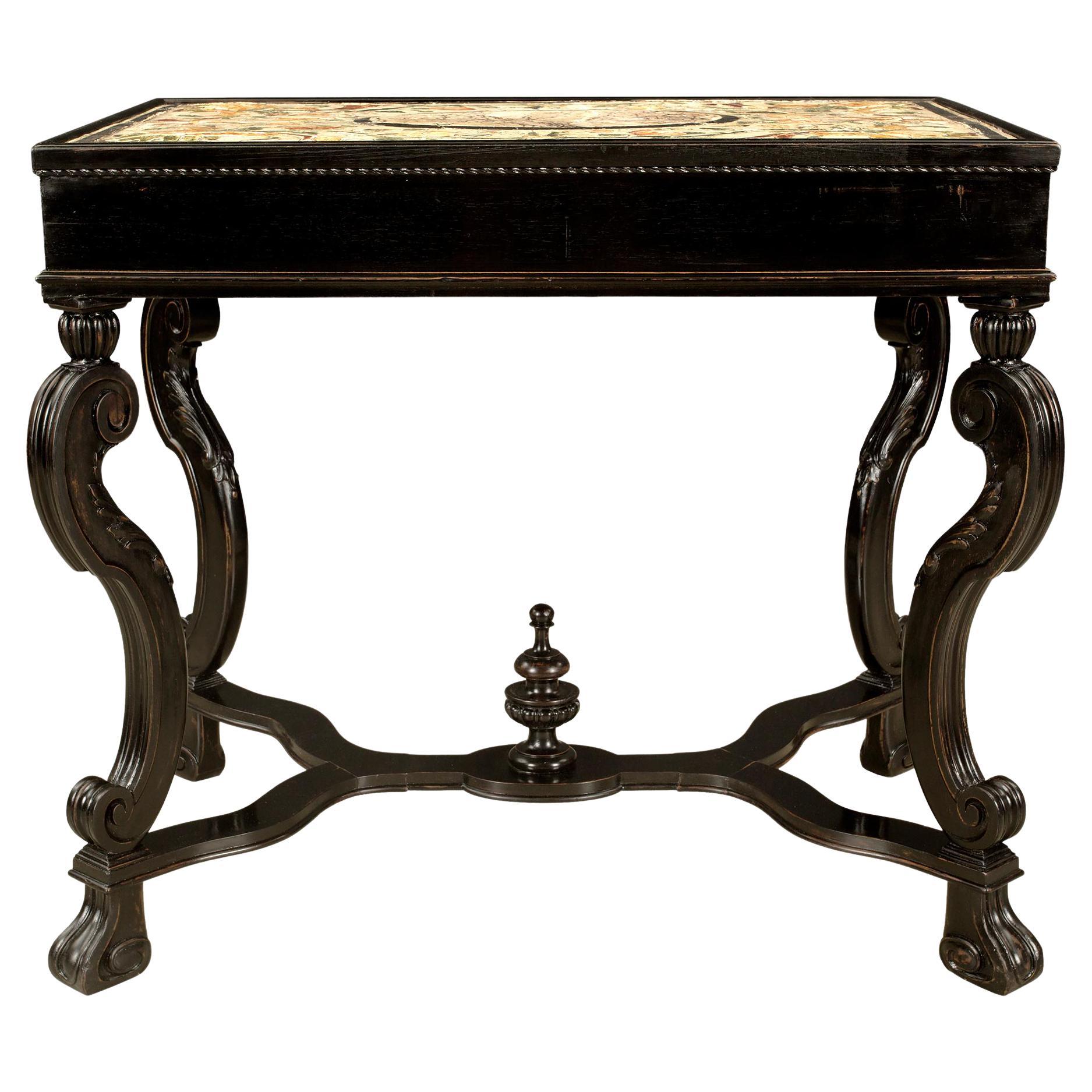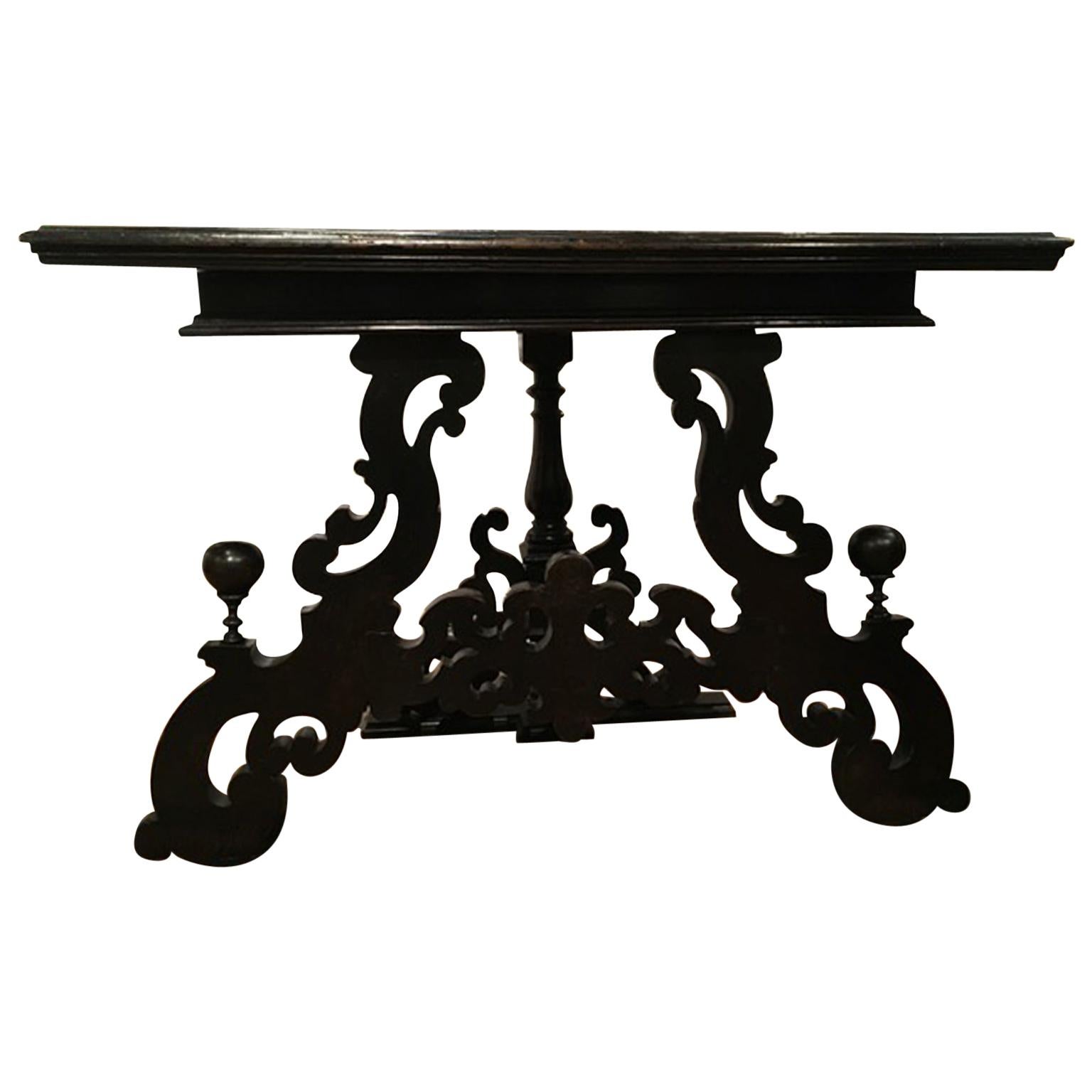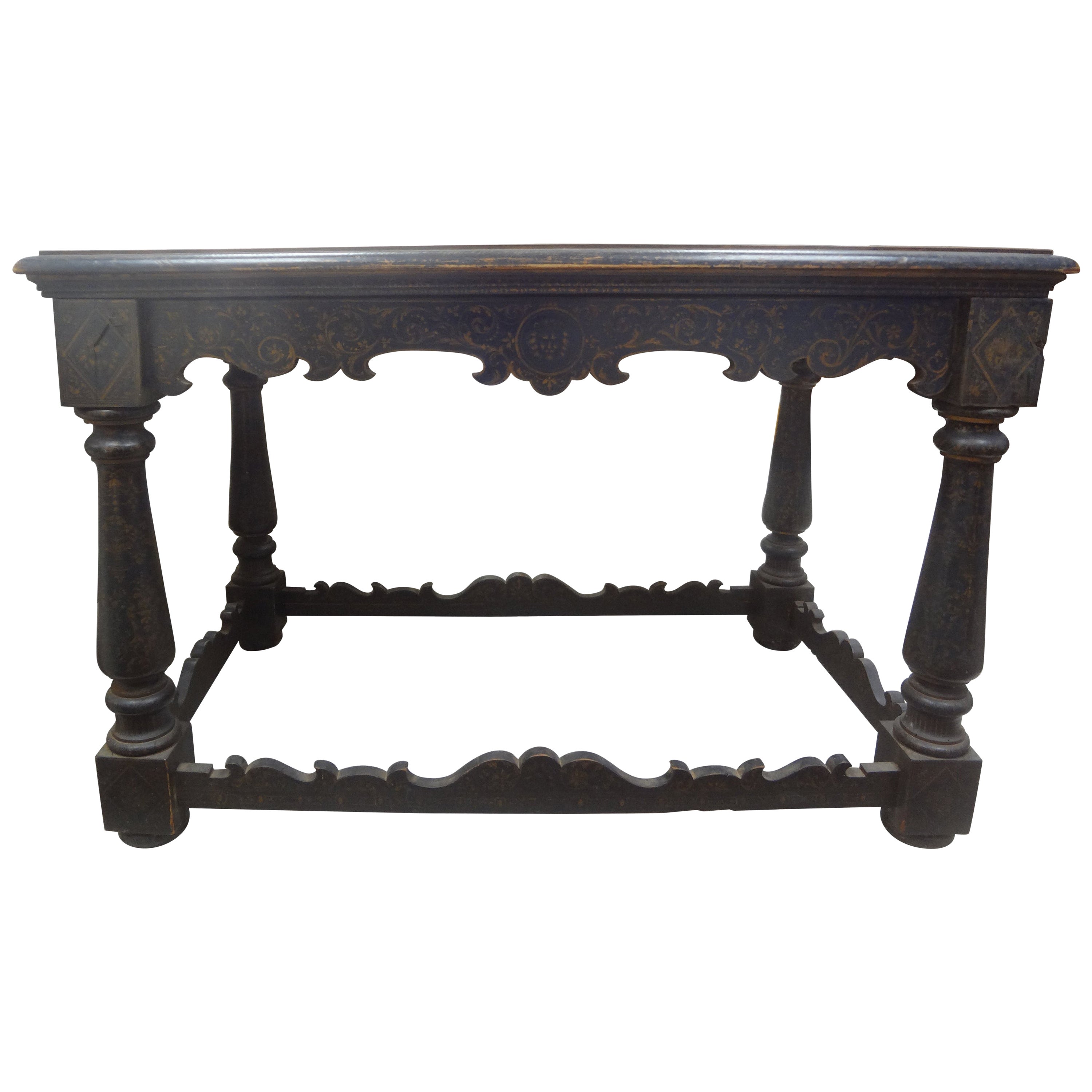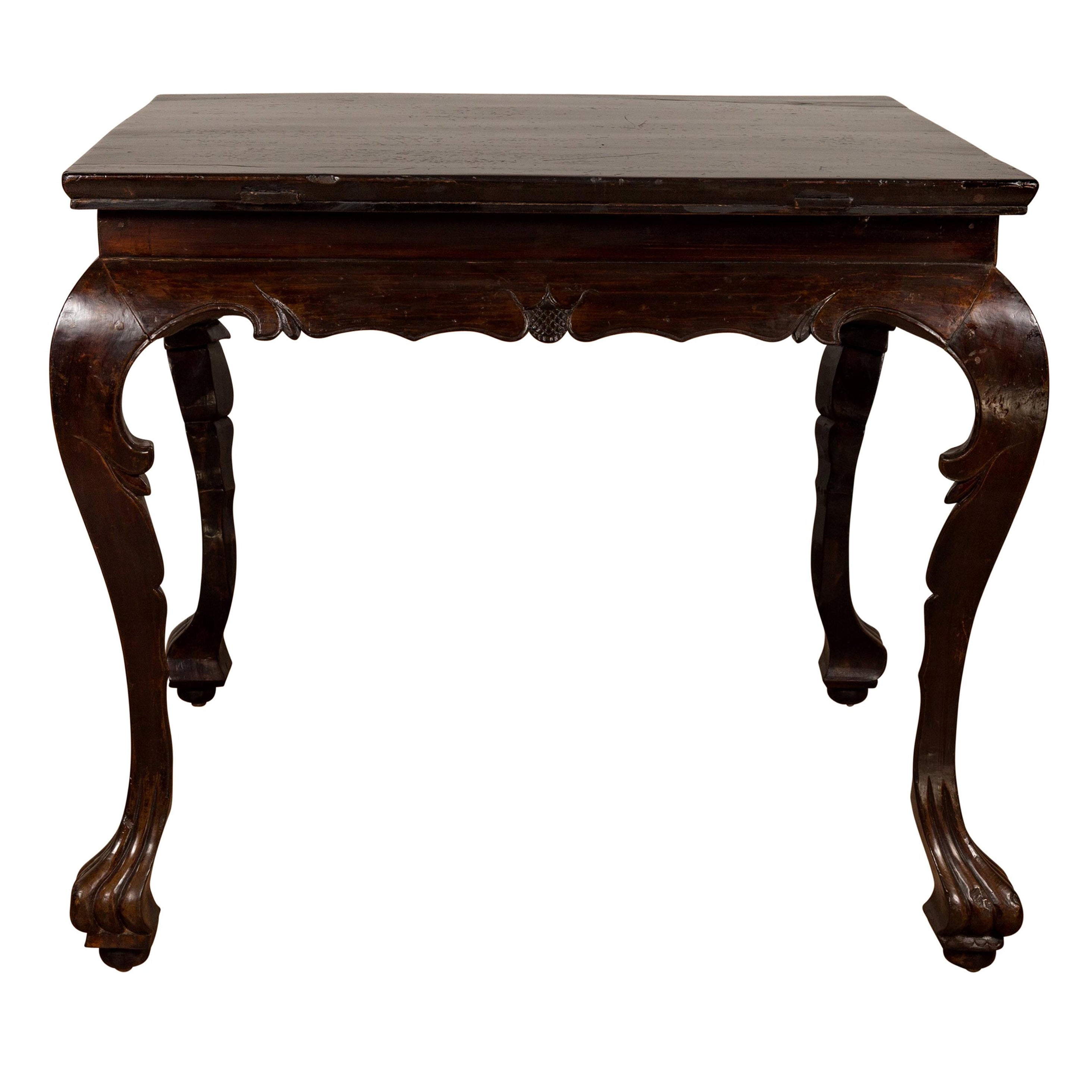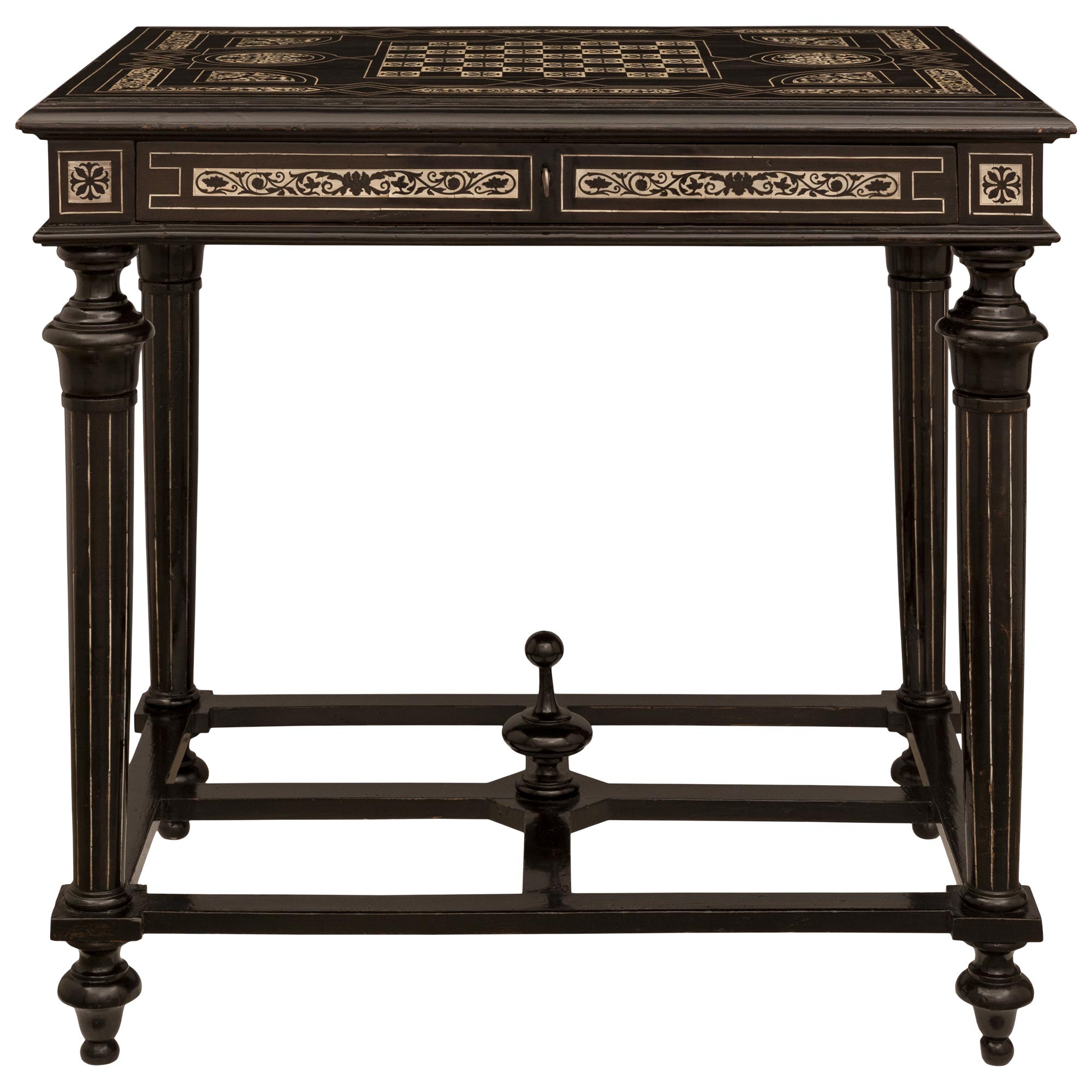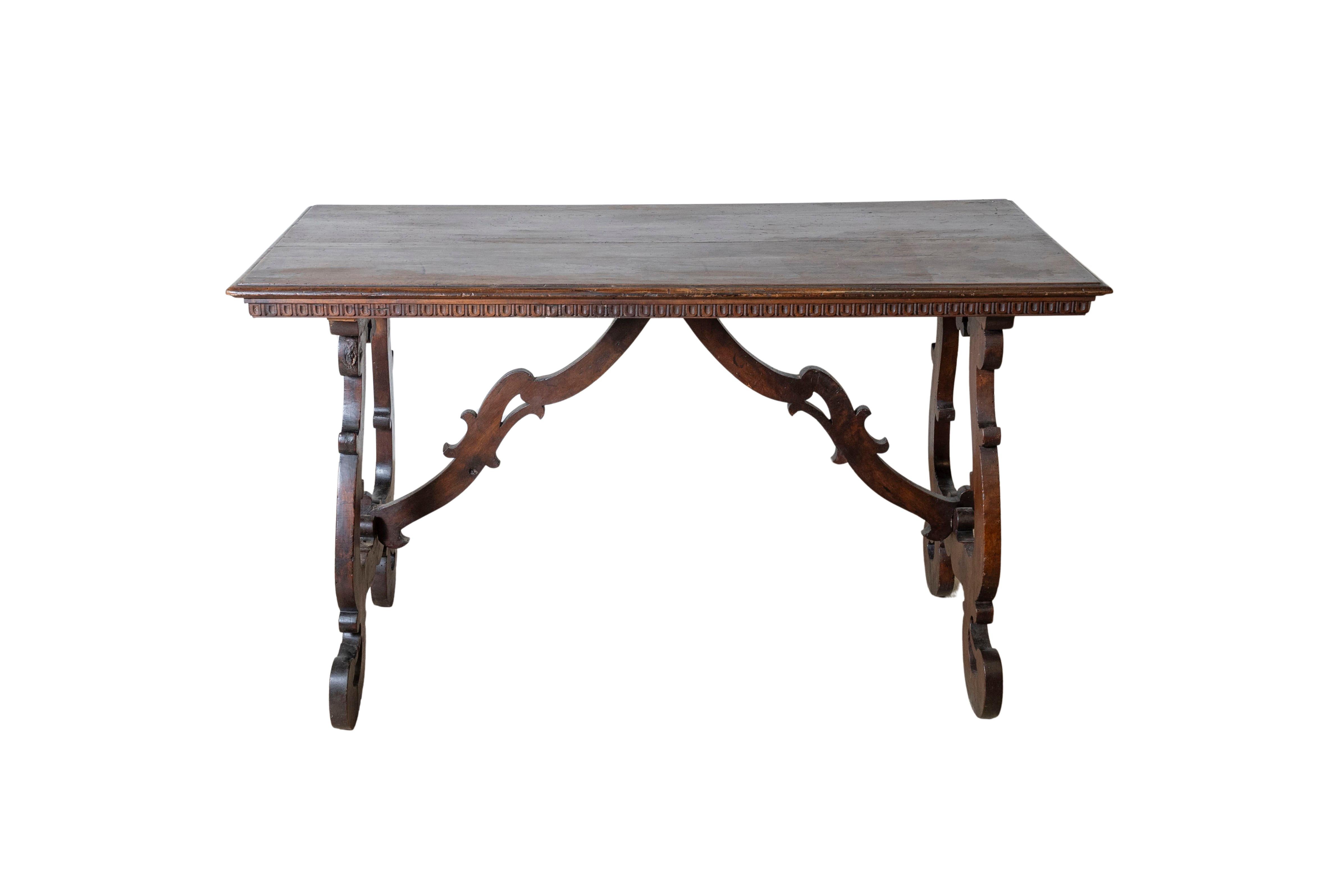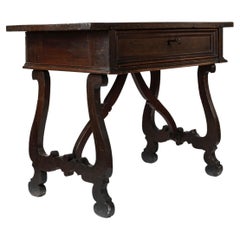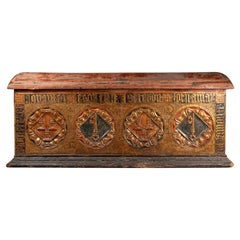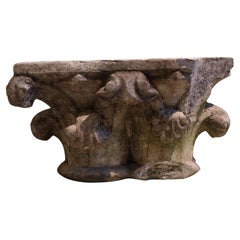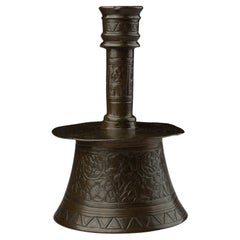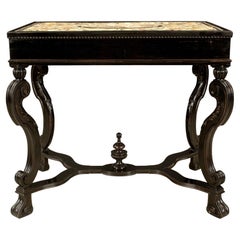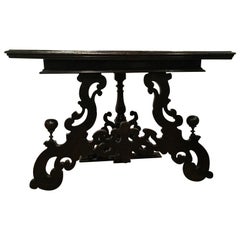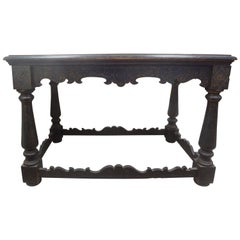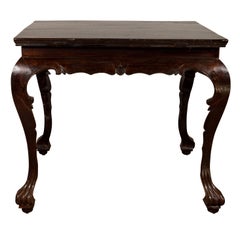Items Similar to 17th century wood and black marble table - North of Italy
Want more images or videos?
Request additional images or videos from the seller
1 of 6
17th century wood and black marble table - North of Italy
$13,122.02
£9,701.28
€11,000
CA$18,049.15
A$20,062.75
CHF 10,516.46
MX$245,014.70
NOK 131,291.97
SEK 123,521.25
DKK 83,742.82
About the Item
Walnut and marble table
North of Italy, 17th century
Wood and black marble
H 80,5 x L 114 x P 58 cm
This elegant table features a one single solid marble top directly mounted on four "Lira" shaped legs in baroque style. The walnut legs have a mixtilíneo cut, based on incoming and outgoing of great dynamism and decorative sense. Beautiful plateau in deep black marble with a fine grain, speckled with white fossil remnants and traversed by veins. The brightness and depth of the black and the contrasts with the white lend a special elegance and sophistication to this marble.
This table is an excellent example of true Italian craftsmanship.
Beyond their practical use, tables also held symbolic significance. In an era when furniture was a reflection of one’s social status, owning a table made of fine wood and marble was a clear indicator of wealth and sophistication. These tables often occupied prominent positions within a room, serving as focal points that demonstrated the owner's appreciation for art and fine craftsmanship.
The enduring appeal of this 17th century table is a testament to the skill of the artisans who created them and the timeless nature of their designs.
Beautiful patina
- Dimensions:Height: 31.7 in (80.5 cm)Width: 46.07 in (117 cm)Depth: 22.84 in (58 cm)
- Style:Baroque (Of the Period)
- Materials and Techniques:
- Place of Origin:
- Period:
- Date of Manufacture:17th century
- Condition:Repaired: The marble plateau has been restored; scarcely visible. Wear consistent with age and use.
- Seller Location:Bruxelles, BE
- Reference Number:1stDibs: LU6666239763462
About the Seller
5.0
Vetted Professional Seller
Every seller passes strict standards for authenticity and reliability
1stDibs seller since 2022
15 sales on 1stDibs
Typical response time: 1 hour
- ShippingRetrieving quote...Shipping from: Bruxelles, Belgium
- Return Policy
Authenticity Guarantee
In the unlikely event there’s an issue with an item’s authenticity, contact us within 1 year for a full refund. DetailsMoney-Back Guarantee
If your item is not as described, is damaged in transit, or does not arrive, contact us within 7 days for a full refund. Details24-Hour Cancellation
You have a 24-hour grace period in which to reconsider your purchase, with no questions asked.Vetted Professional Sellers
Our world-class sellers must adhere to strict standards for service and quality, maintaining the integrity of our listings.Price-Match Guarantee
If you find that a seller listed the same item for a lower price elsewhere, we’ll match it.Trusted Global Delivery
Our best-in-class carrier network provides specialized shipping options worldwide, including custom delivery.More From This Seller
View AllWalnut Table "a lira" - Tuscany, 17th century
Located in Bruxelles, BE
Walnut Table "a lira" - Tuscany, XVII century
Table “a lira”
Walnut
Tuscany, XVIIth century
71 X 90 X 49,5 cm
Beautiful patina.
Category
Antique 17th Century Italian Renaissance Desks and Writing Tables
Materials
Walnut
Rare pastiglia marriage chest - North of Italy, First half of 15th century
Located in Bruxelles, BE
Rare pastiglia marriage chest
North of Italy, Liguria or Piemonte
First half of 15th century
wood, gesso, partly gilded, form molded and painted
67 x 156 x 63 cm
Provenance :
Pri...
Category
Antique 15th Century and Earlier Italian Renaissance Blanket Chests
Materials
Gesso, Wood
double capital - french, end of 13th century
Located in Bruxelles, BE
Double capital with hook decorations
Grey stone
France, 13th century
Reduced—cut in the back in modern times
H 22 x L 41 x P 20 cm
'Hook' is the name given today to these ornamen...
Category
Antique 15th Century and Earlier French Medieval Architectural Elements
Materials
Stone
Veneto- Saracenic candlestick - 15th century
Located in Bruxelles, BE
Veneto- Saracenic candlestick
Engraved bronze
15th century
13 x 8,5 cm
This rare candlestick exemplify exquisite craftsmanship, featuring a bell-shaped base with a flared foot adorn...
Category
Antique 15th Century and Earlier Italian Renaissance Chandeliers and Pen...
Materials
Bronze
Veneto- Saracenic candlestick - 15th century
Located in Bruxelles, BE
Veneto- Saracenic candlestick
Engraved bronze
15th century
12,5 x 6,2 cm
This rare candlestick exemplify exquisite craftsmanship, featuring a bell-shaped base with a flared foot ado...
Category
Antique 15th Century and Earlier Italian Renaissance Chandeliers and Pen...
Materials
Bronze
Pair of Wooden Chairs, Lombardy, 17th Century
Located in Bruxelles, BE
Pair of beautifully carved wooden chairs
Lombardy, first half of 17th century
H 86 x L 48 x P 43 cm
Pair of “da balia” (nanny) chairs. The backrest is decorated with winged myt...
Category
Antique 17th Century Italian Renaissance Chairs
Materials
Wood
$9,304 / set
You May Also Like
Italian 19th Century Baroque St. Ebonized Fruitwood And Scagliola Center Table
Located in West Palm Beach, FL
A most attractive and unique Italian 19th century Baroque st. ebonized fruitwood and Scagliola center table. The rectangular table is raised by four 'S' scrolled legs with a reeded o...
Category
Antique 19th Century Italian Baroque Center Tables
Materials
Scagliola, Fruitwood
Late 17th Century Italian Wood Ebony Hand Carved Black Marble Console
Located in Brescia, IT
This antique black ebony wood console, is an example of the fine quality and capability in handcrafting of the Italian 17th Century masters. The top is in a rare black Italian marble...
Category
Antique Late 17th Century Italian Baroque Console Tables
Materials
Ebony
18th Century Italian Louis XIV Ebonized Center Table
Located in Houston, TX
18th Century Italian Louis XIV Ebonized Center Table.
Our handsome rectangular period 18th century Tuscan ebonized fruitwood table, side table or center table has turned legs, a beau...
Category
Antique 18th Century Italian Louis XIV Center Tables
Materials
Fruitwood
Antique Center Hall Table with Black Lacquered Top and Cabriole Legs
Located in Yonkers, NY
A Chinese antique center hall table from the early 20th century, with black lacquered top and brown stained legs. Born in China during the ea...
Category
Early 20th Century Chinese Center Tables
Materials
Wood
Italian Early 19th Century Louis XVI St. Ebony Table
Located in West Palm Beach, FL
A very attractive Italian early 19th century Louis XVI st. ebony table. The table is raised by tapered legs with topie feet joine...
Category
Antique Early 19th Century Italian Louis XVI Tables
Materials
Bone, Ebony
Early 18th Century Italian Fratino Table in Walnut, Umbrian Origin
Located in Atlanta, GA
A stately Umbrian fratino table in solid walnut, dating circa 1720. This early 18th century refectory table features a rectangular top with a finely carved dentil edge, a subtle yet elegant detail that enhances its architectural presence.
The table is supported by bold lyre-shaped legs, each ending in a graceful scroll and connected by a sculptural curved stretcher, which adds both stability and visual rhythm to the piece. Rich in patina, the walnut displays warm, honeyed tones and natural grain movement that speak to centuries of history and craftsmanship.
Originally used in monasteries or noble residences, this table embodies the simplicity and solidity of traditional Italian design while offering timeless beauty and functionality. Ideal as a dining table, console, or statement piece in a grand hallway, this rare Umbrian example captures the soul of 18th century Italian furniture...
Category
Antique 18th Century Italian Console Tables
Materials
Walnut
More Ways To Browse
Antique Table Plateau
French Four Glass Clock
Gold Claw Table
Hacienda Furniture
Nepal Statue
Oyster Veneer
Paris Bistro
Pull Down Chart
Red Lacquer Chinoiserie Cabinet
Rococo Wall Panel
Rust Ottoman
Silver Enamel Cigarette Case
Sunflower Plates
Thai Bird
Vintage Dumas
Vintage Fish Dish
Vintage Horn Table
Vintage Match Holders
